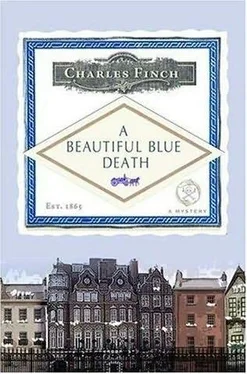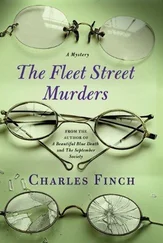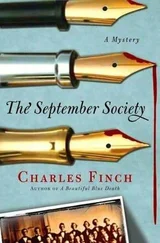Charles Finch - Beautiful blue death
Здесь есть возможность читать онлайн «Charles Finch - Beautiful blue death» весь текст электронной книги совершенно бесплатно (целиком полную версию без сокращений). В некоторых случаях можно слушать аудио, скачать через торрент в формате fb2 и присутствует краткое содержание. Жанр: Исторический детектив, на английском языке. Описание произведения, (предисловие) а так же отзывы посетителей доступны на портале библиотеки ЛибКат.
- Название:Beautiful blue death
- Автор:
- Жанр:
- Год:неизвестен
- ISBN:нет данных
- Рейтинг книги:5 / 5. Голосов: 1
-
Избранное:Добавить в избранное
- Отзывы:
-
Ваша оценка:
- 100
- 1
- 2
- 3
- 4
- 5
Beautiful blue death: краткое содержание, описание и аннотация
Предлагаем к чтению аннотацию, описание, краткое содержание или предисловие (зависит от того, что написал сам автор книги «Beautiful blue death»). Если вы не нашли необходимую информацию о книге — напишите в комментариях, мы постараемся отыскать её.
Beautiful blue death — читать онлайн бесплатно полную книгу (весь текст) целиком
Ниже представлен текст книги, разбитый по страницам. Система сохранения места последней прочитанной страницы, позволяет с удобством читать онлайн бесплатно книгу «Beautiful blue death», без необходимости каждый раз заново искать на чём Вы остановились. Поставьте закладку, и сможете в любой момент перейти на страницу, на которой закончили чтение.
Интервал:
Закладка:
But all the same he felt as if he knew nothing. Who were George Barnard’s houseguests other than Claude, the young man he had met? Had any of them discovered the gold? How had the murderer’s path crossed the housemaid’s; had they had some relationship? Was he dismissing too quickly the possibility that a friend or a lover had done it because he was focused on the cost and obscurity of the poison and the presence in the house of the mint’s money?
Many murders, he knew, are solved within twenty-four hours. The rest, from his experience, were never solved or took weeks. But at least, he thought with grim satisfaction, he was ahead of Exeter, who was still twisting his whiskers and thinking the girl had destroyed herself while his underlings stroked his ego.
There were too many pieces to the puzzle, if anything. The factors that usually determine a murderer’s identity had been thrown into doubt immediately.
He pondered the case for half an hour-and then remembered something that Jeremiah Jones had said, thought curiously about it for a moment, and decided he would wait until Graham had come home to think about Prue Smith again. He searched through the books on his desk, found his old copy of Tom Brown’s Schooldays, and opened it in the middle.
He read quite contentedly until eight, when he had to dress for supper with his friend Lord Cabot, who shared with him a sportsman’s interest in politics, and a few friends, at their club, the Travelers. He had put on his dinner jacket and combed his hair when, just as he was nearly ready to leave, he heard the servants’ door open and close and knew from the buzz of voices that Graham was home.
He went down to the hallway and at the same time heard footsteps on the stairs below, and a moment later his butler came in, looking worse for the day’s wear, much as Lenox him-self must have looked when he had come home that evening-cold and unhappy.
“Graham!” he said.
“Sir.”
“Lovely day out, isn’t it?”
“No, sir, if I may contradict you.”
Lenox laughed. “Why are you up here, anyway?”
“I thought you might want to discuss the matter we spoke about yesterday evening right away, sir.”
“No, no,” said Lenox, “go to your room, have a fire, change your clothes, and doze off. If only to please me. And have some tea.”
“Yes, sir.”
“We can talk later this evening or tomorrow morning.”
“Very well, sir. Good evening.”
Graham began to walk back down the stairs tiredly. Lenox stood and listened, heard a door shut beneath, and turned to the housekeeper.
“Will you take him the tea yourself?”
“Oh, yes, sir,” she said.
“It’s my fault he had to go out at all.”
“I will indeed, sir.”
“Excellent.” He turned and began to walk toward the front door but stopped and turned around. Then he paused and didn’t say anything.
After a moment, the housekeeper said, “Sir?”
“Mary,” he said, “will you also take one of those little chocolate cakes I like so well, when you take him his tea? He might enjoy that.”
“Of course, sir.”
“That’ll do,” he said to himself, and opened the front door to leave.
Chapter 12
M ost of the gentlemen’s clubs of London were on Pall Mall and St. James’s Street, near Hampden Lane, and Lenox belonged to several of them. Every group of people had a club-the Gresham for merchants, the Hogarth for artists, the Army and Navy, called Rag and Famish by its members, for veterans-but Lenox’s clubs were of a higher caste, being clubs dedicated not to a pursuit, by and large, but to the aristocracy.
They mostly resembled one another, being wide white town-houses, usually in the Italianate style, and four or five stories high. Each of them served a different mood or clique.
For instance, he had first joined the Athen?um Club, on Pall Mall, and still spent several evenings a month there. It had the best club library in England and excellent food, and most of his friends from school and university belonged there.
He also went to the Savile Club, which was less politics and more art and science, to the Devonshire Club, which was for members of a liberal bent, and to the Eton and Harrow, on Pall Mall East, for graduates of those two public schools. He belonged to the Oriental Club and the Marlborough Club, the latter of which was considered perhaps the most prestigious in London. And then there was the Oxford and Cambridge Club, at 71 Pall Mall, which was shortly to play a role in the case.
They were almost all in limestone buildings, and they were all very comfortable inside, particularly the Athen?um and the Devonshire. They all had central halls, where ceremonies and large dinners were held, and where you checked for your friends in thick chairs next to warm fireplaces. Beyond the large halls were a series of smaller rooms for smaller groups: billiard rooms, card rooms, grand old libraries where members dozed off with The Times on their laps, chess rooms, tearooms, and, of course, places to eat.
The reason these clubs flourished, Lenox felt, was that this was an age of unusually rigid separation between men and women. He and Lady Jane ignored that separation, but most men spoke very little with women except at parties, and were most comfortable playing a hand of cards or smoking a cigar with their friends, a kind of solidarity encouraged in grammar school, public school, and university, all of which excluded women.
Lenox also belonged to the Travelers Club, on St. James’s Street, and there, in the long lounge that evening, the last two members by the fire were Lord Cabot and Charles Lenox-both of whom, it could be presumed, had at least once traveled 500 miles in a straight line from the center of London, which was the very minimum requirement of that club. Lenox wished he had gone farther than Russia-he wished he had gone to the Cape of Good Hope, like Stanley Foster, another member-but he enjoyed the club’s company nonetheless. Its members were the most interesting and idiosyncratic of the aristocratic class, from every field and every pursuit, with an emphasis on scholarship. Lenox’s father had helped found it, because his own clubs were too full of bores; everybody in the Travelers was an expert on something-ancient Welsh agriculture or Persian illuminated manuscripts or Shakespeare’s problem comedies, or imperial Rome, like Lenox-even those with other careers. The building itself was an old stone one, comfortable inside, with a sizable library and a good dining room. Lenox often went there to read at night and perhaps run into a friend who also loved to travel.
But now they were in the lounge, which was a long hall with a painted ceiling and heavy armchairs. Each man had a drink in his hand, and Cabot held the poker and constantly shifted the dying embers in the hearth. He was a fat man with white hair, tidily dressed, and with a quick smile.
The fire was warm, but outside the sounds of a blizzard shuffled against the windows, the fiercer wind that rises when the streets are abandoned at night, the swirls of wet snow against the ground, and the boots of the last men out hurrying along the pavement toward home.
They were talking about the Commons, as they always did when they had supper. Their other friends had melted away by now.
“Your brother,” said Lord Cabot. “There’s an example.”
“Of what?”
“A man with no more idea of leadership than of becoming a chimney sweep! Great fella, you know, and votes well, when he comes to town, but my question is, Who, when he sits in his seat, tells him what to do? Leadership!”
“You may underestimate my brother. He surprised me today.”
“But you do see my point, Lenox!”
“You think we have no man the equal of Disraeli on the liberal side.”
Читать дальшеИнтервал:
Закладка:
Похожие книги на «Beautiful blue death»
Представляем Вашему вниманию похожие книги на «Beautiful blue death» списком для выбора. Мы отобрали схожую по названию и смыслу литературу в надежде предоставить читателям больше вариантов отыскать новые, интересные, ещё непрочитанные произведения.
Обсуждение, отзывы о книге «Beautiful blue death» и просто собственные мнения читателей. Оставьте ваши комментарии, напишите, что Вы думаете о произведении, его смысле или главных героях. Укажите что конкретно понравилось, а что нет, и почему Вы так считаете.












